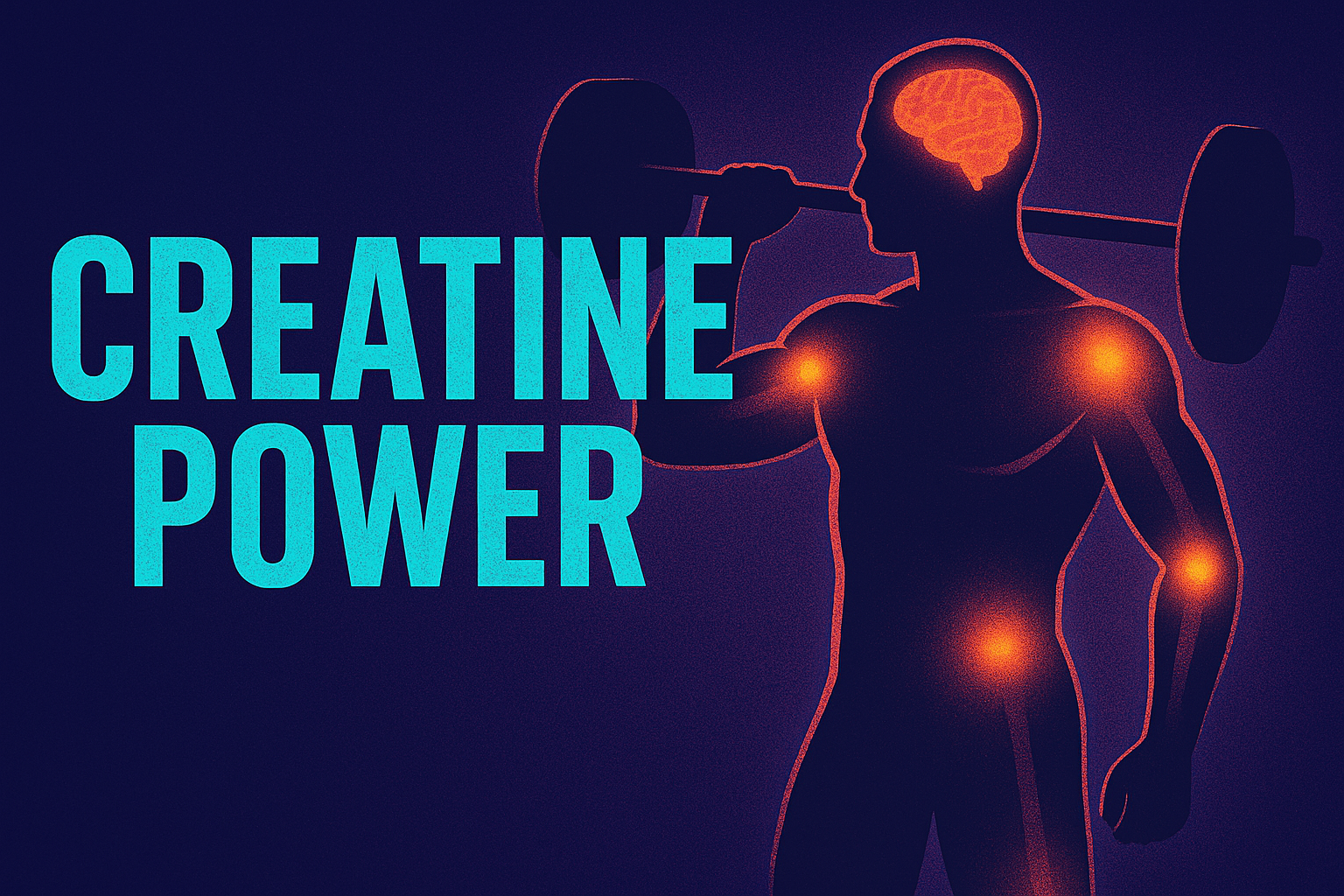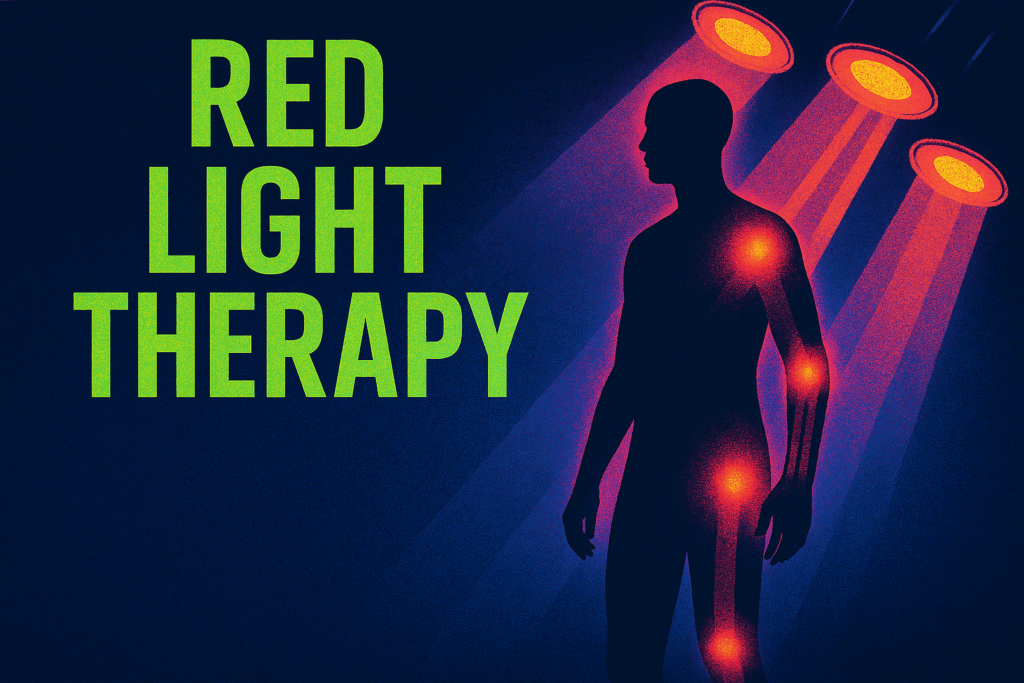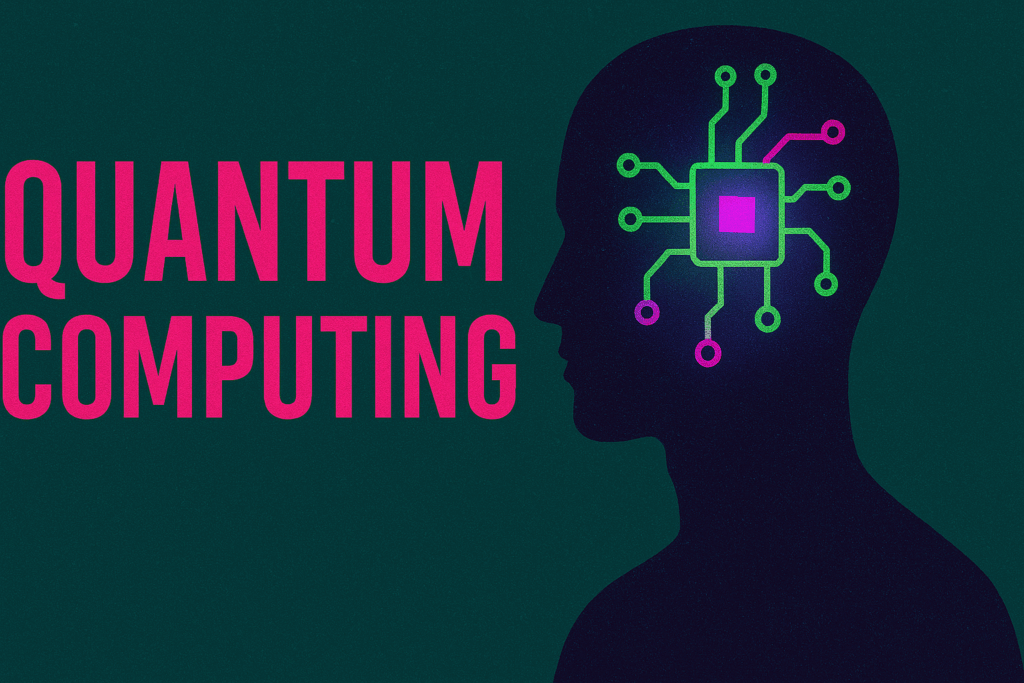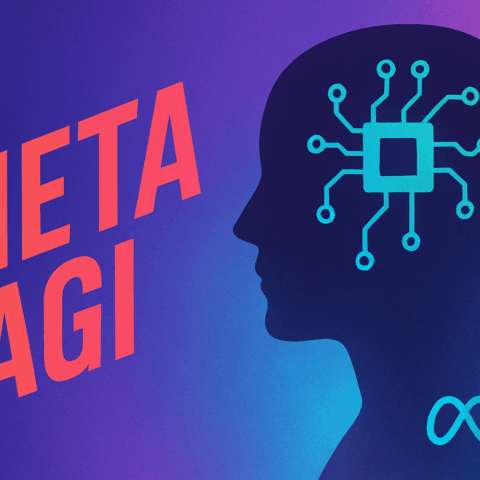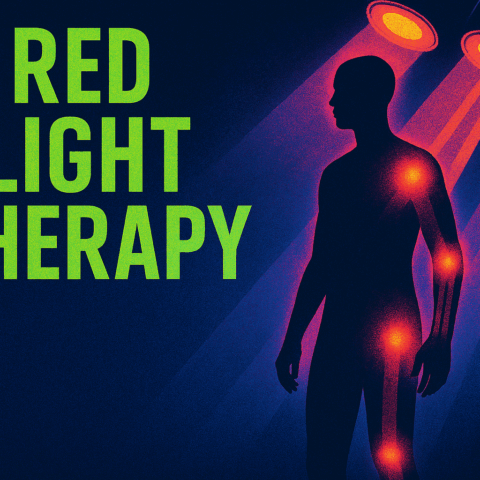Introduction
Creatine has long been a go-to supplement for bodybuilders and athletes looking to boost muscle strength and power, but today its use is expanding far beyond the gym. In the age of biohacking, this unassuming molecule is finding its way into morning routines, military rations, and even the desks of tech professionals. Once known mainly for bulking up muscles, creatine is now being embraced as a fuel for the mind. Influencers, biohackers, and scientists alike are extolling “creatine for brain health” in addition to its physical benefits. In fact, creatine is one of the most extensively studied performance supplements, with decades of research supporting its efficacy and safety (House committee encourages DoD to study creatine for military meals). As we’ll explore, recent science and real-world trends suggest creatine could play a pivotal role in daily health optimization, cognitive enhancement, and the future of human performance.
Background
What is creatine? Creatine is a nitrogen-containing organic compound synthesized in our bodies (from the amino acids arginine, glycine, and methionine) and obtained through diet (especially from meat and fish) (Frontiers | The effects of creatine supplementation on cognitive function in adults: a systematic review and meta-analysis). In the body, creatine acts as a critical energy reserve. After uptake into cells, it is converted to phosphocreatine (PCr), which can rapidly donate a phosphate group to regenerate adenosine triphosphate (ATP) – the cell’s primary energy currency (Frontiers | The effects of creatine supplementation on cognitive function in adults: a systematic review and meta-analysis). This phosphocreatine system serves as a fast recharge for ATP, particularly during short bursts of intense effort or high metabolic demand. Muscles store the bulk of the body’s creatine (around 95%), but the brain also holds a small yet crucial reserve (Frontiers | Creatine supplementation is safe, beneficial throughout the lifespan, and should not be restricted) (Frontiers | Creatine supplementation is safe, beneficial throughout the lifespan, and should not be restricted). During moments of intense physical exertion or mental strain, these creatine stores help cells (muscle and neural) keep up with energy needs, delaying fatigue and maintaining performance (The New Neuroscience of Creatine for Brain Health | Psychology Today).
How does creatine work in muscles and brain? In skeletal muscle, extra creatine means more PCr is available to rapidly recycle ATP, which translates to the ability to squeeze out that extra rep in the weight room or sprint just a bit faster. This is why creatine supplementation reliably increases strength, power, and high-intensity exercise performance, and it promotes greater gains in muscle mass during training (Frontiers | Creatine supplementation is safe, beneficial throughout the lifespan, and should not be restricted). Importantly, creatine’s benefits aren’t limited to muscles. The brain, which consumes a large share of the body’s energy, also uses creatine to buffer energy supply. Neurons take up creatine via specialized transporters and store it as PCr, just like muscle cells. In fact, emerging research in neuroscience shows creatine helps replenish brain energy during high cognitive demand, supports mitochondrial function, and even influences neural plasticity (The New Neuroscience of Creatine for Brain Health | Psychology Today). The critical role of creatine in brain function is highlighted by rare genetic disorders that disrupt creatine synthesis or transport – patients with these conditions suffer severe developmental and cognitive impairments until creatine is supplemented through other means. This underscores that creatine is not just “muscle fuel” but a key nutrient for our nervous system.
A brief history and safety record: Creatine was identified in the 19th century, but it entered the athletic scene in the early 1990s after Olympic athletes reportedly used it to gain a competitive edge. Since then, it has become a mainstream supplement. Over 500 peer-reviewed studies have investigated creatine, and expert panels (like the International Society of Sports Nutrition) have repeatedly confirmed its efficacy and safety ( Common questions and misconceptions about creatine supplementation: what does the scientific evidence really show? – PMC ) (Frontiers | Creatine supplementation is safe, beneficial throughout the lifespan, and should not be restricted). Unlike exotic nootropics or experimental drugs, creatine is a natural component of our diet and body; taking it simply tops up our natural stores. It is Generally Recognized as Safe (GRAS) and well-tolerated in healthy populations, with no evidence of harm to the kidneys, liver, or other organs at recommended doses (Frontiers | Creatine supplementation is safe, beneficial throughout the lifespan, and should not be restricted). This robust safety profile, combined with its low cost and significant benefits, has paved the way for creatine’s expansion from niche sports supplement to a broad tool for health and performance.
Current State of Creatine Use
Creatine supplementation today spans a remarkable variety of domains, driven by both scientific evidence and grassroots enthusiasm. From professional athletes to software engineers, many are incorporating creatine into their daily regimen to gain an edge. Below is an overview of how creatine is being used across different fields:
| Domain | Examples of Use | Reported Benefits & Findings |
|---|---|---|
| Sports & Athletics | Weightlifters, sprinters, team sport athletes use creatine as part of training programs. Creatine is included in pre-workout formulas and recovery shakes. | Improved muscle strength and power output; increased sprint speed and jumping ability; greater muscle mass gains during resistance training ([Frontiers |
| Military & Tactical | Soldiers and special forces members use creatine to enhance physical conditioning. The U.S. military is considering adding creatine to field rations (MREs). | Increases in strength and endurance for load-bearing tasks; faster recovery in training. U.S. House Armed Services Committee (2024) highlighted creatine’s long history of improving muscle performance and encouraged the DoD to include it in troop Meals-Ready-to-Eat (House committee encourages DoD to study creatine for military meals). Military research notes creatine can boost strength, sprint performance, and reduce exercise-induced muscle damage (House committee encourages DoD to study creatine for military meals). |
| Biohackers & Tech Professionals | Silicon Valley entrepreneurs, engineers, e-sports gamers, and productivity hackers include creatine in “nootropic” stacks alongside caffeine, omega-3s, etc. Often taken daily (3–5 g) as a cognitive enhancer. | Enhanced mental stamina and focus, especially under stressful conditions (e.g. coding sprints, long hours) ([What are the cognitive benefits of creatine monohydrate and how significant are they? |
| General Health & Aging | Middle-aged and older adults take creatine for daily health optimization – often alongside exercise – to support muscle and brain health. Being added to wellness routines for longevity and healthy aging. | Helps preserve muscle mass and strength, combating age-related sarcopenia ([Frontiers |
As the table above suggests, creatine’s role has broadened from a supplement for athletes into a multipurpose performance and wellness enhancer. In sports, creatine is practically ubiquitous – a standard part of elite training. It’s often deemed “the most effective nutritional supplement for improving strength and power” in high-intensity exercise (Frontiers | Creatine supplementation is safe, beneficial throughout the lifespan, and should not be restricted). Athletes who use creatine regularly can expect noticeable improvements in muscle strength, sprint speed, and recovery, which is why professional sports teams and trainers widely endorse it. The compound even shows benefits in contact sports: for example, creatine users have shown lower severity of concussions and traumatic brain injuries, hinting at a protective effect on the brain (Frontiers | Creatine supplementation is safe, beneficial throughout the lifespan, and should not be restricted).
What’s new and exciting is creatine’s surge in popularity among non-athletes. Students pulling all-nighters, programmers debugging through dawn, or jet-lagged executives – many are experimenting with creatine to stay mentally sharp. Early scientific evidence backs up some of these cognitive benefits: a recent systematic review (2024) concluded that creatine supplementation has significant positive effects on memory and attention, and can speed up information processing (Frontiers | The effects of creatine supplementation on cognitive function in adults: a systematic review and meta-analysis). While creatine isn’t a stimulant like caffeine, users describe its effects as subtle but tangible: better focus, less mental fatigue, and feeling more “fueled” during cognitively demanding tasks. These effects are especially pronounced in situations of extreme strain. For instance, creatine has been shown to sharpen cognitive performance in sleep-deprived individuals and at high altitudes, conditions that normally drain the brain’s energy quickly (What are the cognitive benefits of creatine monohydrate and how significant are they? | Ask Huberman Lab). Military researchers have taken note of this, since soldiers in the field often face fatigue and oxygen deprivation – creatine could help them maintain vigilance and decision-making abilities when it matters most.
The military domain indeed provides a striking real-world case of creatine’s expanding role. In mid-2024, a U.S. House Armed Services Committee report on defense nutrition explicitly encouraged the Department of Defense to study adding creatine to soldiers’ standard issue Meals Ready-to-Eat (House committee encourages DoD to study creatine for military meals). This move was backed by data from over 2,000 clinical trials on creatine’s benefits, ranging from faster muscle recovery to improved cognitive function (House committee encourages DoD to study creatine for military meals) (House committee encourages DoD to study creatine for military meals). The rationale is clear: even a slight improvement in a soldier’s physical strength or mental alertness could be invaluable. The military’s own supplement safety office notes that individual responses vary, but overall creatine reliably boosts strength, power, and muscle mass, and may reduce fatigue-related muscle damage (House committee encourages DoD to study creatine for military meals). So, tomorrow’s soldiers might get a daily dose of creatine with their rations – a far cry from creatine’s old reputation as “just a gym supplement.”
Meanwhile, in offices and co-working spaces, creatine is becoming a quiet part of the tech worker’s toolkit. While not as hyped as nootropics like modafinil or L-theanine, creatine’s appeal is that it’s legal, cheap, and naturally part of our physiology. Many biohackers view it as a low-risk, high-reward addition to their routine – a sort of nutritional insurance for both brain and body. It’s not uncommon to hear a software developer crediting creatine for helping them power through long coding sessions or a data scientist including it in their morning smoothie for “mitochondrial support.” High-profile biohacking figures have also taken note. For example, Dr. Andrew Huberman (a Stanford neuroscientist and popular podcaster) publicly recommends 5 grams of creatine daily, citing “ample evidence” that it can enhance cognitive function, especially for those who don’t eat much meat (Stanford Neuroscientist Andrew Huberman’s Nutrient and Supplement List for Brain Health). The endorsement of such experts has further validated creatine in the eyes of the tech and wellness community.
Even for those interested in longevity and healthy aging, creatine is emerging as a promising tool. Researchers studying aging note that muscle weakness and cognitive decline – two big age-related concerns – are precisely the areas creatine seems to help. Several studies in older adults have found that creatine combined with exercise training leads to greater improvements in muscle strength and daily functioning compared to exercise alone (Frontiers | Creatine supplementation is safe, beneficial throughout the lifespan, and should not be restricted). On the cognitive side, higher creatine intake has been associated with better memory, and trials are examining whether creatine can slow neurodegenerative processes. While not a magic bullet, creatine might help “recharge” aging cells. Its support of mitochondrial health and potential to reduce brain inflammation (as recent studies suggest) could make it a valuable anti-aging supplement for the brain (The New Neuroscience of Creatine for Brain Health | Psychology Today) (The New Neuroscience of Creatine for Brain Health | Psychology Today). It’s telling that some geriatric specialists are now discussing creatine in the context of preventative nutrition – much like one would talk about omega-3 fatty acids or vitamin D – as a safe way to preserve muscle and cognitive resilience into older age.
Challenges and Misconceptions
Despite creatine’s growing acceptance, several challenges and misconceptions persist that temper its universal adoption. It’s worth addressing these head-on:
- Safety Myths: Creatine has battled a number of stubborn myths about its safety. Common misconceptions include “Creatine will damage your kidneys or liver,” “Creatine causes dehydration and cramps,” or “Creatine is like an anabolic steroid.” These claims are not supported by the scientific evidence. Extensive clinical trials and long-term studies have found no adverse effect on kidney or liver function in healthy individuals (Frontiers | Creatine supplementation is safe, beneficial throughout the lifespan, and should not be restricted). In fact, creatine’s safety record is so strong that even pediatric and adolescent use has been deemed safe in research settings (Frontiers | Creatine supplementation is safe, beneficial throughout the lifespan, and should not be restricted) (Frontiers | Creatine supplementation is safe, beneficial throughout the lifespan, and should not be restricted). Creatine is not a steroid – it’s a nutrient; it has none of the hormonal effects that steroids do. As for dehydration and muscle cramps, studies have shown creatine either has no effect or even a beneficial effect on hydration status and electrolyte balance when adequate fluid is consumed ( Common questions and misconceptions about creatine supplementation: what does the scientific evidence really show? – PMC ) ( Common questions and misconceptions about creatine supplementation: what does the scientific evidence really show? – PMC ). The bottom line is that for healthy people, creatine used at recommended doses (3–5 grams daily, or up to ~20 g/day for a short loading phase) is overwhelmingly safe. Nevertheless, it’s always advised to stick to recommended dosages and consult a doctor if you have pre-existing kidney disease or other serious conditions.
- Hair Loss Concerns: One particular myth gained traction from a single 2009 study in rugby players, which reported that creatine supplementation slightly increased levels of dihydrotestosterone (DHT), a hormone linked to male pattern baldness. This led to headlines that “creatine causes hair loss.” However, no study to date has actually shown creatine causes hair loss or baldness in users ( Common questions and misconceptions about creatine supplementation: what does the scientific evidence really show? – PMC ) ( Common questions and misconceptions about creatine supplementation: what does the scientific evidence really show? – PMC ). The study in question found a rise in DHT within normal ranges and did not report any hair loss in the participants ( Common questions and misconceptions about creatine supplementation: what does the scientific evidence really show? – PMC ). Subsequent research has not replicated even the DHT finding, and overall testosterone levels were unchanged ( Common questions and misconceptions about creatine supplementation: what does the scientific evidence really show? – PMC ). In summary, the hair loss rumor remains unsubstantiated – it appears to be a classic case of a single study being overextended into a scare story. Individuals with genetic hair loss predisposition should monitor their hair health, but creatine itself is not considered a significant risk factor by experts reviewing the literature.
- Variable Response and Water Weight: Not everyone who takes creatine will notice the exact same effects. There is a phenomenon of “responders” and “non-responders” – people with lower baseline creatine stores (such as vegetarians or those with smaller muscle mass) tend to see the most dramatic gains, whereas those who eat a lot of meat or have naturally high creatine may see more modest changes. Additionally, when first starting creatine, the body’s tissues (especially muscle) will store more water along with the creatine. This can lead to a quick 1–2 kg increase in weight. While this is not harmful – it’s essentially increased intracellular water, not fat – some people misunderstand it as bloating or assume they are gaining fat. Proper education is needed so that users aren’t surprised by this benign water-weight gain, and understand that it’s actually a sign creatine is working to volumize muscles. Adjusting dosage (taking a lower daily dose without a high loading dose) can minimize rapid water retention if it’s a concern.
- Regulatory and Scientific Skepticism: Another challenge is that while the science is strong for physical performance, the evidence for cognitive benefits, though promising, is still emerging. As a result, regulators have been cautious. For example, a European Food Safety Authority panel concluded in recent years that a cause-and-effect relationship between creatine and improved cognitive function had not yet been firmly established (Creatine and improvement in cognitive function – EFSA). This doesn’t mean creatine has no cognitive benefit – rather, it means the data didn’t meet the high bar for an approved health claim at that time. Part of the difficulty in proving cognitive enhancement is the variability in study designs: different doses, durations, and cognitive tests yield mixed results. Some studies show clear improvements in memory or mental fatigue, while others find minimal effects in young healthy adults who may already have adequate brain creatine levels (Frontiers | The effects of creatine supplementation on cognitive function in adults: a systematic review and meta-analysis) (Frontiers | The effects of creatine supplementation on cognitive function in adults: a systematic review and meta-analysis). The challenge for scientists is to determine in whom and under what conditions creatine works best for the brain. Is it most useful when one is sleep-deprived, or for vegetarians, or older adults, or perhaps only after long-term use? These questions are actively being investigated. In the meantime, public perception can lag behind the latest evidence. Many still view creatine as “just for gym bros,” not realizing that it’s a general health and performance compound. Overcoming these outdated perceptions is an ongoing task.
- Logistical Hurdles in Certain Applications: If we look toward more extreme uses – say, enhancing soldiers in the field or astronauts in space – there are practical challenges. For instance, creatine supplementation typically requires daily dosing and a steady intake to keep muscle and brain stores topped up. It also degrades in solution over time, which means you can’t pre-mix it in a drink and leave it for days. In military deployment or space travel scenarios, ensuring a stable supply chain of any supplement and keeping it potent can be tricky. Moreover, in the context of cognitive enhancement, one obstacle has been that the brain’s uptake of creatine is relatively slow. Early research indicated you might need weeks of supplementation to significantly raise brain creatine levels, since the blood-brain barrier limits the rate at which creatine enters the brain (Single dose creatine improves cognitive performance and induces changes in cerebral high energy phosphates during sleep deprivation | Scientific Reports). (The muscle, by contrast, loads up more quickly.) This poses a challenge for acute use – you can’t just pop a creatine pill and expect instant mental effects the same day. However, as we’ll discuss next, new strategies are being tested to overcome this limitation.
Future Outlook
Looking ahead, the role of creatine is poised to grow even more innovative and integrated into personalized health and high-performance lifestyles. Several trends and research avenues suggest creatine will be fueling minds and muscles in ways we are only beginning to imagine:
- Personalized Medicine & Routine Wellness: It’s conceivable that in the near future, creatine supplementation could become a standard recommendation in certain individualized health plans. With the rise of personalized medicine, doctors might assess a patient’s diet, activity level, and even genetic factors to decide if they would benefit from creatine. For example, someone who is older and losing muscle, or a young adult on a vegetarian diet (which provides little creatine), might be proactively advised to take a daily creatine supplement much like they’d take a multivitamin. Indeed, a coalition of leading researchers recently suggested that all individuals could consider taking about 2–3 grams of creatine per day to support general health and cellular energy metabolism (Frontiers | Creatine supplementation is safe, beneficial throughout the lifespan, and should not be restricted). In the future, we might see functional foods fortified with creatine – imagine creatine-enriched protein bars, or meal replacement shakes with added creatine for cognitive and muscular endurance. Because creatine is tasteless and easily added to many foods, it could seamlessly fortify our nutrition. The challenge will be educating healthcare providers and the public that certain groups (e.g. the elderly, those with muscle-wasting conditions, those under high cognitive load) can use creatine as a preventative or therapeutic nutrient. We may also see routine blood or muscle tests for creatine levels to identify who has low stores and stands to benefit most, making supplementation truly personalized.
- Neuroenhancement & Cognitive Applications: The coming years will likely bring more clarity and innovation to creatine’s nootropic (brain-boosting) potential. Ongoing studies are examining its effects on conditions like mild depression, concussion recovery, and even neurodegenerative diseases. For instance, preliminary trials suggest creatine might improve outcomes after traumatic brain injury, reducing symptoms like headache and dizziness and aiding quicker recovery (What are the cognitive benefits of creatine monohydrate and how significant are they? | Ask Huberman Lab). Neurologists are intrigued by creatine’s ability to support ATP generation in brain cells and buffer against energy crises that occur in injuries or diseases. In terms of healthy individuals, a big question has been how to get creatine effectively into the brain. Future solutions might involve higher-dose protocols or novel forms of creatine that cross the blood-brain barrier more efficiently. A groundbreaking study in 2024 demonstrated that giving a single large dose of creatine (about 0.3 g per kg body weight) during a period of sleep deprivation could acutely improve cognitive performance and brain energy metrics (Single dose creatine improves cognitive performance and induces changes in cerebral high energy phosphates during sleep deprivation | Scientific Reports). The researchers achieved this by timing the dose to when the brain was craving energy (after many hours awake), essentially “hacking” the transport system to pull in more creatine (Single dose creatine improves cognitive performance and induces changes in cerebral high energy phosphates during sleep deprivation | Scientific Reports) (Single dose creatine improves cognitive performance and induces changes in cerebral high energy phosphates during sleep deprivation | Scientific Reports). This kind of finding opens the door for strategic use of creatine in high-stress, high-fatigue scenarios – think emergency responders working through the night or even astronauts during extended space missions. We may see specialized creatine formulations (like liposomal creatine or creatine salts) designed to be taken in specific situations for a quick cognitive boost. Additionally, creatine could be combined with other nootropics in synergy; for example, pairing it with caffeine (which would address immediate alertness) and creatine (addressing sustained cellular energy) to cover different aspects of cognitive enhancement.
- Athletic and Military Performance Enhancement: In the realm of sports and defense, creatine’s future seems assured – not as a banned substance, but as a standard performance aid and recovery tool. Sports science continues to find new applications: from using creatine to help prevent muscle disuse atrophy when athletes are injured, to exploring creatine’s role in injury recovery (some physical therapists include creatine to help patients regain strength faster after orthopedic surgeries). The military, as noted, is actively evaluating creatine for wide deployment. If the Department of Defense formally adds creatine to MREs, it sets a precedent for institutional use of performance supplements. We might then see spin-offs like military-endorsed creatine hydration packs or energy bars for soldiers in the field. Creatine could also integrate into training programs for firefighters, police, and other tactical professionals who need peak physical conditioning. An interesting angle is combining creatine with training technologies: for example, pairing creatine supplementation with blood-flow restriction training (a modern rehab technique) to preserve muscle in astronauts or injured soldiers. The space industry is already investigating how resistance exercise plus creatine might counteract the muscle and bone loss experienced in microgravity (Protective alleles and precision healthcare in crewed spaceflight | Nature Communications). One NASA-related review noted that targeted nutrients like resveratrol and creatine could be key non-pharmacological countermeasures for long-term spaceflight health (Towards human exploration of space: The THESEUS review series …) (Protective alleles and precision healthcare in crewed spaceflight | Nature Communications). In the future, every astronaut’s diet may include creatine to ensure they come back to Earth with their muscles and minds as strong as when they left.
- Integration into Society and Culture: Finally, the cultural perception of creatine is likely to keep shifting. As knowledge spreads, creatine may shed whatever stigma remains and be seen more like a wellness supplement for everyone – not just young male athletes. We could imagine a scenario where college students take creatine during exam prep weeks on their doctor’s advice, or an executive in a high-pressure job includes creatine as part of a “stress resilience” regimen. The concept of “fueling the brain” will gain more mainstream traction, and creatine’s story – from meat extract in a lab to a cornerstone of biohacking – will be a case study in how our understanding of nutrition evolves. Also, because creatine is inexpensive and unpatented, it might play a role in public health initiatives: for instance, programs to maintain muscle health in aging populations or in rehabilitation settings could utilize creatine as a cost-effective intervention. On the flip side, supplement companies will undoubtedly continue to innovate with creatine products – we’re already seeing creatine gummies, effervescent tablets, and combinations like creatine with electrolytes for better uptake. The future might bring “smart” creatine supplements that time-release or target specific tissues.
Conclusion
Creatine has entered a new era – the age of biohacking and broad-spectrum optimization – where it is valued as a fuel for both minds and muscles. What began as a niche supplement for power athletes is now a subject of interdisciplinary interest, from neurology labs to military nutrition programs. We’ve seen that creatine supplementation can enhance athletic performance, and mounting evidence shows it can benefit cognitive function, especially under conditions of stress or fatigue. Its reputation has evolved from gym staple to potential “next caffeine” for mental energy (albeit working via a very different mechanism). Crucially, creatine’s strong safety profile and natural presence in our bodies make it an attractive candidate to integrate into daily health regimens and future performance strategies.
Of course, creatine is not a panacea or magic smart drug – it won’t turn an average person into a super-athlete or genius overnight. Like any supplement, it works best as one piece of a larger puzzle including good nutrition, exercise, and rest. Yet, as this article has explored, creatine’s versatility is remarkable: it can help a sprinter run faster, a soldier endure longer, and perhaps one day help a programmer think clearer or an elderly person remember better. The coming years will undoubtedly bring deeper understanding of how creatine can be tailored to individual needs and novel scenarios. As research continues and public awareness grows, creatine is poised to become a foundational tool in the quest to optimize human performance and health. In the age of biohacking, where we aim to be the best versions of ourselves, creatine is proving to be a reliable ally – a time-tested molecule that is fueling our muscles, our brains, and our collective imagination for what’s possible in the future of enhancement.
Sources:
- Kreider, R. B. et al. (2023). Common questions and misconceptions about creatine supplementation: what does the scientific evidence really show? ( Common questions and misconceptions about creatine supplementation: what does the scientific evidence really show? – PMC ) ( Common questions and misconceptions about creatine supplementation: what does the scientific evidence really show? – PMC )
- Zhang, W. et al. (2024). The effects of creatine supplementation on cognitive function in adults: a systematic review and meta-analysis. Frontiers in Nutrition, 11:1424972. (Frontiers | The effects of creatine supplementation on cognitive function in adults: a systematic review and meta-analysis) (Frontiers | The effects of creatine supplementation on cognitive function in adults: a systematic review and meta-analysis)
- Wildman, R. et al. (2025). Creatine supplementation is safe, beneficial throughout the lifespan, and should not be restricted. Frontiers in Nutrition, 12:1578564. (Frontiers | Creatine supplementation is safe, beneficial throughout the lifespan, and should not be restricted) (Frontiers | Creatine supplementation is safe, beneficial throughout the lifespan, and should not be restricted)
- Perlmutter, A. (2025). “The New Neuroscience of Creatine for Brain Health.” Psychology Today, April 16, 2025. (The New Neuroscience of Creatine for Brain Health | Psychology Today) (The New Neuroscience of Creatine for Brain Health | Psychology Today)
- House Armed Services Committee Report on NDAA FY2025 (2024). Consideration of Including Creatine in Meals Ready to Eat. U.S. House of Representatives. (House committee encourages DoD to study creatine for military meals) (House committee encourages DoD to study creatine for military meals)
- Huberman, A. (2023). Andrew Huberman’s Nutrient & Supplement List for Brain Health. NAD Research press. (Stanford Neuroscientist Andrew Huberman’s Nutrient and Supplement List for Brain Health)
- Gordji-Nejad, A. et al. (2024). Single dose creatine improves cognitive performance and induces changes in cerebral high energy phosphates during sleep deprivation. Scientific Reports, 14:4937. (Single dose creatine improves cognitive performance and induces changes in cerebral high energy phosphates during sleep deprivation | Scientific Reports) (Single dose creatine improves cognitive performance and induces changes in cerebral high energy phosphates during sleep deprivation | Scientific Reports)
- Operation Supplement Safety – Creatine Fact Sheet (2023). Department of Defense, Human Performance Resource Center. (House committee encourages DoD to study creatine for military meals)
- Ostojic, S. M. (2021). Creatine supplementation in health and disease. Nutrients, 13(2):447. (Referenced via Frontiers in Nutrition Opinion) (Frontiers | Creatine supplementation is safe, beneficial throughout the lifespan, and should not be restricted)
- EFSA Panel (2021). Scientific opinion on creatine in cognitive function. European Food Safety Authority Journal 19(5):6768. (Creatine and improvement in cognitive function – EFSA)

